Helen Lowe's Blog, page 290
July 28, 2011
Astronomy Picture of the Day
Between working on my own books, and keeping up with the reading on other peoples' books, especially those on various SFF award lists around the globe, I haven't had a lot of time for astronomy fun lately. So today I thought I'd just briefly mention one of my favourite sites, NASA's Astronomy Picture of the Day.
Each day this wonderful site features an image of a space related theme, with an explanation by a professional astronomer. So if, like me, every now and then you like to look up and see the stars and imagine the sheer amazingness of the cosmos "out there", then this could be a site that you will enjoy as well.
Just to give you a taste of the astronomical goodness to be experienced, here is July 15th's picture of the day, which shows two overlapping galaxies. To see the image in full and read the professional explanation of all this wonder, click here.
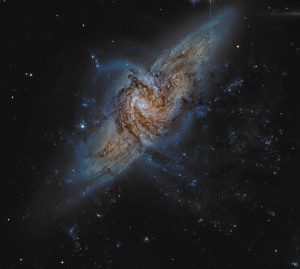
NGC3314, Overlapping Galaxies
July 27, 2011
Hugo Awards Reading Report 4: The Novels—"Cryoburn" by Lois McMaster Bujold
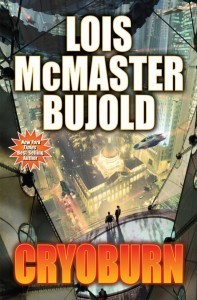 My reading of the Hugo Award finalists for Best Novel is proceeding a-pace and my report back "de jour" is on the fourth of the six novels to be read, Lois McMaster Bujold's Cryoburn. (I note that I think Connie Willis' Blackout and All Clear, with a report still to come, are being treated as one book for the purposes of the award, but reading-wise it's definitely two books.)
My reading of the Hugo Award finalists for Best Novel is proceeding a-pace and my report back "de jour" is on the fourth of the six novels to be read, Lois McMaster Bujold's Cryoburn. (I note that I think Connie Willis' Blackout and All Clear, with a report still to come, are being treated as one book for the purposes of the award, but reading-wise it's definitely two books.)
Those of you who have been following these reports will be familiar with my evaluation criteria by now. But for others for whom this may be a first report, I have set the criteria out in full at the end of the post (below the complete list of finalists for the award.) Any specific considerations that have come up for me in relation to a specific work I mention within the body of a report.
Cryoburn by Lois McMaster Bujold.
The Basic Story:
Lois McMaster Bujold's Miles Vorkosigan embarks on another adventure, this time on the world of Kibou-daini where those who can afford it buy cryogenic storage instead of death, with the expectation that they will be revived when either a cure for their terminal illness or life prolonging technology is developed. With the proposed expansion of Kibou-daini's cryo corporations onto the worlds of the Barrayar empire, Miles Vorkosigan, in his role as Imperial Auditor, attends a conference on Kibou-daini to begin his investigations. Bribery and kidnap follow and Miles finds himself uncovering corporate chicanery, corruption, and a miscarriage of justice …
The Report:
Cryoburn is space opera, a form of science fiction where the focus is less on science and technological evolution as humankind advances into space, and more on fun characters and derring-do within some future space milieu. So although cryogenic technology is central to the plot, the story does not focus on it in the same way that a book like CJ Cherryh's Cyteen, for example, focuses on genetic engineering, or William Gibson's Neuromancer on the evolution of sentient AIs. The Cryoburn story is mainly another adventure of the irrepressible Miles Vorkosigan. The ongoing adventures of a particular hero protagonist are one of the defining characteristics of space opera as a subgenre of SFF—and Lois McMaster Bujold's Miles Vorkosigan is one of the more enduring and popular of such heroes.
Having only read the first of the Miles Vorkosigan novels before Cryoburn (which is, I believe, something like the 12th or 13th in the sequence) I am not well qualified to comment on the development of Miles as a character through the series. But it is at least clear to me that evolution has occurred: the Miles of this book is definitely a more mature character—as he should be, since twenty years of intervening adventure and experience has elapsed.
Genre-wise, therefore, I think Cryoburn is a good example of the space opera subgenre. In terms of the story, I found it an enjoyable light read. The plot was well crafted, the characters likeable and engaging, although I thought that they were stock "types": e.g. Miles as the (albeit more mature) enfant-terrible trickster-hero; Roic, the loyal, competent soldier-retainer; Jin and Mina, the cute, plucky kids. So no in-depth character studies here, but a likeable, recognizable cast moving—for me, reasonably predictably—through a light-adventure read. The other aspect I note in terms of the cast of characters is that other than a brief appearance by the "goons", Hans and Oki, toward the end of the story, there are no "bad guy" characters either featured or explored in any depth.
Overall, I enjoyed Cryoburn, which held my attention throughout. But it did not engage me deeply as a story, either in terms of the plot or characters. There were no great surprises and no major highs or lows of storytelling, or pushing of the genre envelope. For this reason, although I liked it and would read another Vorkosigan novel on its strength, I will hesitate over Cryoburn's ranking on my Hugo ballot, given that the Hugo is an award for the very best speculative fiction novel in the world published in 2010.
—
To reiterate, the complete list of finalists for the Hugo Award for Best Novel, by book title, comprises:
Blackout/All Clear by Connie Willis (Ballantine Spectra; Allen & Unwin here in AU/NZ)
Cryoburn by Lois McMaster Bujold (Baen)
The Dervish House by Ian McDonald (Gollancz; Pyr) – you can read my report here
Feed by Mira Grant (Orbit) – again, you can read my report here
The Hundred Thousand Kingdoms by N.K. Jemisin (Orbit) – my report is here
The evaluation criteria I am using for all the Best Novel finalists are as follows:
– the use of genre elements in the work, i.e. its strength as a work of speculative fiction;
– whether the book works for me as a story, i.e. is it compelling, well written and engaging, with particular regard to the emotional depth to the story telling and interesting ideas (although not necessarily for their own sake.) Consistency of both characters and plot is really important to me. And I do rate good use of humour in the story.
– It has also emerged through my previous reports that I appreciate a good 'twist in the tale', although I don't actively require it to enjoy a book—good characters and a good tale well told are my baseline.
My next and final report will be on Connie Willis' Blackout and All Clear, with a round up on all six finalists to follow.
July 26, 2011
Hugo Awards Reading Report 3: The Novels—"The Dervish House" by Ian McDonald
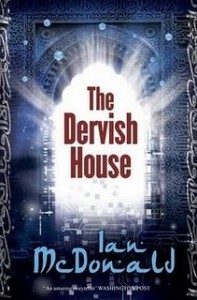 The Reporting Rolls On …
The Reporting Rolls On …That July 31 deadline for final voting on the Hugo Awards is coming up very fast now—that's the bad news. The good news is that I have now read all the short story and novelette finalists and nearly finished all the novels, with half of Connie Willis' All Clear (definitely the 'fattest" of all the contenders) to go. Today I am doing my report back on Ian McDonald's The Dervish House.
Before starting, I will also briefly reiterate the evaluation criteria I am using for all the Best Novel finalists:
– the use of genre elements in the work, i.e. its strength as a work of speculative fiction, given that the Hugo Award is for excellence in this field;
– whether the book works for me as a story, i.e. is it compelling, well written, and engaging, with particular regard to the emotional depth to the story telling and interesting ideas (although not necessarily for their own sake.) Consistency of both characters and plot is really important to me. And I do rate good use of humour in the story.
– It has also emerged through my previous reports on both The Hundred Thousand Kingdoms and Feed, that I appreciate a good 'twist in the tale', although I don't actively require it to enjoy a book—good characters and a good tale well told are my baseline.
So on to the report.
The Dervish House by Ian McDonald.
The Basic Story:
From the back cover: "In the sleepy Istanbul district of Eskikoy stands the former whirling dervish house of Adam Dede. Over the space of five days of an Istanbul heatwave, six lives weave a story of corporate wheeling and dealing, Islamic mysticism, political and economic intrigue, ancient Ottoman mysteries, a terrifying new terrorist threat, and nanotechnology with the potential to transform every human on the planet."
I think that probably satisfactorily encapsulates the book. The six central characters are: Necdet, a ne-er do well turned visionary; Can Durukan, a sheltered nine-year-old boy with a heart condition who experiences life through the medium of his computer; Georges Ferentinou, an ethnic Greek and retired economist; Adnan Sarioglu, a commodities trader; Ayse Erkoc, an antiquities dealer; and Leyla Gultasli, a commerce graduate looking for a career in marketing.
The Report:
I began reading The Dervish House with some trepidation, because earlier in the year I had been unable to complete Ian McDonald's River of Gods. You may recall that this puzzled me at the time, as River of Gods checked many boxes for the kind of story I like: cyberpunk science fiction, a complex plot, and diverse cultural elements within the story. I thought at the time that it might just have been too demanding a read following the February 22nd earthquake and its aftermath. It was some time later before I realised that I hadn't really liked any of the characters, so found it hard to engage with any of their intersecting stories.
Hence my trepidation with The Dervish House as I could see it was the same kind of story, following the six characters mentioned above and their intersecting lives over the five days referenced in the excerpt from the back cover—a similar story premise to River of Gods. The difference, although the complexity of the plot was still challenging and took time to get into, was that I quickly found myself engaging positively with the characters. I either outright liked or was at least strongly interested in the characters, their backstories, motivations and current situations. I also believe that there is a seventh character in the book, arguably the most engaging and compelling of them all, and that is Istanbul itself—an early positive for me as a reader who has always been fascinated by the portrayal of the city in literature, so I was probably always going to be hooked by those wonderful, poetic lines from the opening page:
"It is after the hour of prayer, but not yet the hour of money. Istanbul, Queen of Cities, wakes with a shout."
In terms of genre, this story of near-future Istanbul where nanotechnology—and also nano-terrorism—is the face of the future, is undoubtedly science fiction. And the kind of SFF I love, with cyberpunk morphing into nanopunk. But the focus on Istanbul itself as character, and the nearness of that future, also makes The Dervish House very close to magic-realism in genre, especially with elements such as Ayse's quest for "The Mellified Man" and Necdet's encounter with Hizir, the Green Saint, as a spirit guide. Although these two elements could potentially sit uneasily together, in The Dervish House the juxtaposition works and is part of the richness of the story.
There are many interwoven elements within the plot of The Dervish House, including historical and political twists and turns, but another element added to the cyber-nanopunk SFF and magic-realism is that this is also a "caper" story (in the same way that The Sting and Ocean's Eleven are "caper" movies.) So plenty of twists and turns for a gal who enjoys a good dose of twisty-turniness in her reading. This also makes The Dervish House into something of a melange, story-wise—and I was very aware of the risk, when reading the first half to two-thirds of the book, that the extent of melange had the potential to overwhelm the story. But in the final half to one-third of the novel, Ian McDonald really pulled it off. The disparate threads of the melange came together into a coherent whole that really worked for me as a reader. I closed the covers and felt both satisfied and as though I wanted more, which is a great feeling. A very big part of that coming together for me was the emotional engagement with the characters.
In terms of quibbles, my main reservation about The Dervish House was that I did have to push myself to get into it. This is storytelling with layers of complexity and McDonald's style is lavish, with a fair bit of description, which I did find difficult, especially when I was still warming to the characters and overall story arc. A little like the stork in the opening passages, I felt that we spent a fair amount of time "circling" the story—but as I have indicated above, both plot and characters definitely came together for me in the latter part of the book and repaid that earlier perseverance.
One thing I found myself really liking about this book was that the ending is upbeat. Possibly because of everything we have been through in Christchurch with earthquakes and their aftermaths, or perhaps because of simply looking at everything happening in the world right now, but I found myself really enjoying the fact that the story came together in an overall positive, upbeat, hopeful way.
So for me, The Dervish House is currently another very strong contender for the top spot on my Hugo Award ballot.
—
To reiterate, the finalists for the Hugo Award for Best Novel, by book title, comprise:
Blackout/All Clear by Connie Willis (Ballantine Spectra; Allen & Unwin here in AU/NZ)
Cryoburn by Lois McMaster Bujold (Baen)
The Dervish House by Ian McDonald (Gollancz; Pyr)
Feed by Mira Grant (Orbit) – you can read my report here
The Hundred Thousand Kingdoms by N.K. Jemisin (Orbit) – again, you can read my report here.
I hope to bring you my report on Cryoburn by Lois McMaster Bujold tomorrow.
July 25, 2011
Tuesday Poem: "It's Over"
On that first afternoon
it was all about noise:
sirens, the continual tuk-tuk-tuk
of helicopters, and the slow drone
of freight planes airlifting in supplies—noise
and the smell of smoke
hanging in a pall
across the inner suburbs
as the CTV building burned.
But in the days following
I recall the silence of a city
where daily business had all but ceased,
cars off the road, people staying home
or fled—over 70,000 now
the pundits claim, since February 22nd—
and at night the profound darkness
of a power blackout. On the evening
when the street lights blinked back on
we were out walking in the blue dusk:
the light overhead flick-flick-flickered –
and then the whole street
was bathed in a saffron haze,
illuminating the other side
of the road and a friend
outside the wreckage
that had once been her business
My friend's father, helping her,
had just lost his home, and she,
looking dry-eyed at collapsed bricks,
said simply: "It's over. It's all over."
.
© Helen Lowe, 2011
—
To read the featured poem on the Tuesday Poem Hub and other great poems from fellow Tuesday poets from around the world, click here or on the Quill icon in the sidebar.
July 24, 2011
Fun With Friends
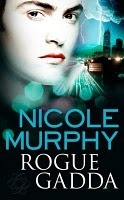 Yesterday I wrote about being in "the lull" between different stages of the book project—and one great thing about that lull is that it also provides an opportunity to catch up with writing friends and what they're doing. So a few weeks back I posted as a guest in Nicole Murphy's "Dreams and Fulfilment" series celebrating the launch of Rogue Gadda, the third and final novel in her Dreams of Asarlai series. And was also delighted to have Nicole as a guest here on "…Anything, Really" talking about "The Challenge."
Yesterday I wrote about being in "the lull" between different stages of the book project—and one great thing about that lull is that it also provides an opportunity to catch up with writing friends and what they're doing. So a few weeks back I posted as a guest in Nicole Murphy's "Dreams and Fulfilment" series celebrating the launch of Rogue Gadda, the third and final novel in her Dreams of Asarlai series. And was also delighted to have Nicole as a guest here on "…Anything, Really" talking about "The Challenge."
Having a little time in hand also means that I have the opportunity to read other writers' work, including works-in-progress. Once such work-in-progress is Ghost Hand (working title), my friend Ripley Patton's first novel. I already know Ripley's accomplished short story work—and the first draft of Ghost Hand did not disappoint. A paranormal YA, I thought the storyline was fresh, the pace good, and the characters interesting—a great start to a first book and I am now really looking forward to seeing the second draft.
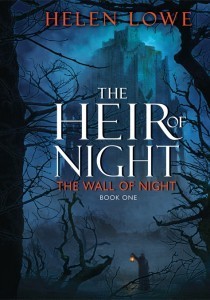 And tomorrow, USA time, I am helping fellow Supernatural Underground author, Juliana Stone, celebrate the forthcoming launch of her latest paranormal romance novel, His Darkest Salvation, by giving away a copy of The Heir of Night. I think Merrie Destefano will also have a book up for giveaway—so head on over to Juliana's site and check out the celebratory and giveaway action there.
And tomorrow, USA time, I am helping fellow Supernatural Underground author, Juliana Stone, celebrate the forthcoming launch of her latest paranormal romance novel, His Darkest Salvation, by giving away a copy of The Heir of Night. I think Merrie Destefano will also have a book up for giveaway—so head on over to Juliana's site and check out the celebratory and giveaway action there.
July 23, 2011
Being In The Lull
As those of you who followed my "Completed Today" mini-series, which you can find in the "What I've been Doing…" category in the right sidebar, will know, meeting my 1 July book deadline for The Gathering of the Lost (The Wall of Night Book Two) was a major, 24/7 project. In a few weeks I know that the copyedit phase of the book will be racing back to hit me, not unlike a freight train in terms of the need to focus in on the nitty-gritty detail of a 200,000 word manuscript. But right now I am in "the lull", that period in between project phases where you take stock and try and figure out what to do with yourself when you're not working 24/7 on "book."
I've already checked the "promptly get ill" box. (Isn't it funny how that happens: that you're working really hard and it's only when you stop that your body says, "whoa, now I can stop"—and promptly picks up whatever current ill is going around?) And I've had my long weekend and have further holiday plans in the wind—an absolute necessity I suspect, for both mental and physical health, given there are still two big books in this series to not just write, but "write right"—but part of being in the lull is that you finally stick your head up above the parapet and take stock of all the things you haven't been doing. Like this year's tax return, now definitely due—and like most of the human race I loathe doing tax returns!
But another big part of that above-the-parapet check is that we are still in earthquake aftermath here. I hesitate a little, given events like the bombing and massacre in Norway over the past few days, because that is such an horrific event and yet here I am, still talking about the aftermath of an earthquake that, however catastrophic, happened five months ago now …
I don't believe, though, that it in any way diminishes the horror of events in Norway, or Syria, or Libya, ot the tsunami and nuclear disaster in Japan, or the tornadoes in the United States, to say that a big part of the background to the past months of striving to complete the book has been living with the aftermath of the earthquake. And part of being in the lull for me has been my mind and eyes 'refocusing' to realise that there is still a huge amount to be done, even at the "suburban rear lines" level, to claw back some level of normalcy and amenity. In many ways it seems a hopeless task, at its lowest level a constant struggle against mud and dust, which always comes back—but I have also realised that it is vital to do it, not to give in but to begin reclaiming your life and home and to keep on taking it back on a day to day, week by week level. Often this means doing the same basic jobs over again, but not to do it means throwing in the towel—and that is untenable, if you plan to dig in and stay.
And although I am sometimes ambivalent about how much I really want to dig in and stay in a city that is probably not going to return to anything approaching what it was for 10-20 years, I know that part of reclaiming Christchurch is to do the small reclaiming every day and week at a domestic level—taking care of the "pence", so to speak, because of we all do that, then the "pounds" that are the city really will recover and evolve out of that.
I have also begun to write a little about the experience of being here through the poems I have been posting as part of the Tuesday Poem Blog community and you can read the poems begun to date, as follows:
A Canterbury Tale
Allow Me to Say
Midwinter
Indifferent Planet
This Will Be Us
July 22, 2011
Another Peek Inside "Tales for Canterbury": "The Daughter of the Khan"
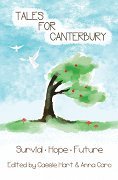 Carrying on with the "peek inside"the Tales for Canterbury anthology, this time looking at Mary Victoria's The Daughter of the Khan, which is another fascinating, magic realism story from the "Hope" section. I also liked the cultural perspective Mary drew on for the story, just a little outside the mainstream of western SFF:
Carrying on with the "peek inside"the Tales for Canterbury anthology, this time looking at Mary Victoria's The Daughter of the Khan, which is another fascinating, magic realism story from the "Hope" section. I also liked the cultural perspective Mary drew on for the story, just a little outside the mainstream of western SFF:
The Daughter of the Khan
by Mary Victoria
Habiba did not wish to be married.
Her prospective mother-in-law had paid a visit to the Ordubad house
the month before, accompanied by the groom's aunt, both thin, severelooking
women with large noses. Habiba had been so dismayed by the
aunt in particular that she had found herself incapable of retaining the
woman's name. Darya? Dilya? She had asked her own mother three times
to remind her of it. Her giddiness had been interpreted by the family as a
bride's typical excitement, but in private, her mother had warned her to
be more circumspect.
"Bibi, my heart," she said to Habiba, heaving a sigh, on the third
occasion the aunt's name was requested, "make an effort. If you don't
get on with your in-laws, you'll find marriage a chore."
Habiba balked at the idea of matrimony altogether, with or without
a forbidding aunt. But that state of bliss, it seemed, had no regard for
her preferences. Her future father-in-law's visit had succeeded that of the
groom's female relatives; dowry negotiations had begun then, in earnest,
on the men's side of the house. Habiba's only part in that process had been
to maintain a decorous and obedient silence when her own father asked
for her consent. Then the matchmakers had come, and the betrothal
had been symbolically rejected and symbolically renewed, signifying how
difficult it was for her parents to let her go. Soon, there would be the
engagement party, the final farewells, and the journey down to the valley,
to her new home.
…
To find out the rest of Habiba's story check out Tales for Canterbury, an anthology of short fiction put together by Cassie Hart and Anna Caro as a fundraiser for the Red Cross Christchurch Earthquake Appeal. The anthology includes a range of short stories donated by both national and international authors and may be purchased from Random Static here.
And Mary has added a little bit more about The Daughter of the Khan backstory on her blog, here, for those who want to find out more.
Another Peek Inside "Tales for Canterbury"
 Carrying on with the "peek inside"the Tales for Canterbury anthology, this time looking at Mary Victoria's The Daughter of the Khan, which is another fascinating, magic realism story from the "Hope" section. I also liked the cultural perspective Mary drew on for the story, just a little outside the mainstream of western SFF:
Carrying on with the "peek inside"the Tales for Canterbury anthology, this time looking at Mary Victoria's The Daughter of the Khan, which is another fascinating, magic realism story from the "Hope" section. I also liked the cultural perspective Mary drew on for the story, just a little outside the mainstream of western SFF:
The Daughter of the Khan
by Mary Victoria
Habiba did not wish to be married.
Her prospective mother-in-law had paid a visit to the Ordubad house
the month before, accompanied by the groom's aunt, both thin, severelooking
women with large noses. Habiba had been so dismayed by the
aunt in particular that she had found herself incapable of retaining the
woman's name. Darya? Dilya? She had asked her own mother three times
to remind her of it. Her giddiness had been interpreted by the family as a
bride's typical excitement, but in private, her mother had warned her to
be more circumspect.
"Bibi, my heart," she said to Habiba, heaving a sigh, on the third
occasion the aunt's name was requested, "make an effort. If you don't
get on with your in-laws, you'll find marriage a chore."
Habiba balked at the idea of matrimony altogether, with or without
a forbidding aunt. But that state of bliss, it seemed, had no regard for
her preferences. Her future father-in-law's visit had succeeded that of the
groom's female relatives; dowry negotiations had begun then, in earnest,
on the men's side of the house. Habiba's only part in that process had been
to maintain a decorous and obedient silence when her own father asked
for her consent. Then the matchmakers had come, and the betrothal
had been symbolically rejected and symbolically renewed, signifying how
difficult it was for her parents to let her go. Soon, there would be the
engagement party, the final farewells, and the journey down to the valley,
to her new home.
…
To find out the rest of Habiba's story check out Tales for Canterbury, an anthology of short fiction put together by Cassie Hart and Anna Caro as a fundraiser for the Red Cross Christchurch Earthquake Appeal. The anthology includes a range of short stories donated by both national and international authors and may be purchased from Random Static here.
July 21, 2011
National Poetry Day—& "The Curve of the World"
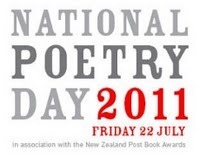 Today, Friday 22 is National Poetry Day here in NZ and events poetic are happening right now—and will be happening all day—all over the country.
Today, Friday 22 is National Poetry Day here in NZ and events poetic are happening right now—and will be happening all day—all over the country.
To look for an event near you, you can check out the National Poetry Day website, here.
On the Tuesday Poem Blog Hub, guest editor Renee Liang has featured poems from the three finalists for this year's 2011 NZ Post National Book Award for Poetry, which will be announced at an awards ceremony to be held in Wellington on 27 July 2011. Renee's guest editorial includes a brief introduction to each of the shortlisted collections, but you can also see each of the featured books here.
Last year, I posted "Ti" for National Poetry Day, and this year I have chosen another poem that I feel has a distinctively New Zealand flavour in terms of landscape/seascape—I hope you enjoy.
The Curve of the World
Summer breathes
through marram grass, salt-tough
where the southerly whips in
off the Pacific, light &
shadow all the way out
to the distant smudge
of albatross feeding—at night
you see lights dance,
squid boats fishing
the same spot.
The larger ships, too,
follow the albatross road,
tall towers disappearing
beneath the curve
of the world …
The wind sweeps in, recounts
tales of ships, albatross,
men with eyes bleached
to seams … tells
it all to the salt grass
and driftwood piled
into a beach fire—
smoke wavers upward
in a thin stream, dissipates
into the gulf
of sky.
.
(c) Helen Lowe
.
Published in JAAM 27: Wanderings, ed. Ingrid Horrocks, 2009
July 20, 2011
Hugo Awards Reading Report 2: The Novels—"Feed" by Mira Grant
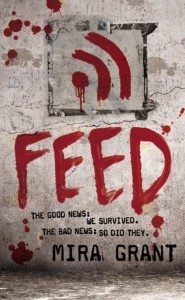 Last Friday, I began my reporting back on the novel finalists for the Hugo Award for Best Novel 2011 with NK Jemisin's The Hundred Thousand Kingdoms, (Orbit.) Today I am continuing with Mira Grant's Feed (Orbit.)
Last Friday, I began my reporting back on the novel finalists for the Hugo Award for Best Novel 2011 with NK Jemisin's The Hundred Thousand Kingdoms, (Orbit.) Today I am continuing with Mira Grant's Feed (Orbit.)
I will also briefly reiterate my evaluation criteria from last Friday's post—bearing in mind that all this reading has to finally result in an ordering of the finalists on the Hugo's ballot. So, briefly, what I am thinking about as a reader is:
– the use of genre elements in the work, ie its strength as a work of speculative fiction;
– whether the book works for me as a story, ie is it compelling, well written and engaging—and remembering from The Hundred Thousand Kingdoms' report that I personally like both emotional depth to my story telling and interesting ideas (although not necessarily for their own sake.) Consistency of both characters and plot is really important to me. And I do rate good use of humor in the story.
– I also mentioned, in relation to The Hundred Thousand Kingdoms, that I appreciate a good 'twist in the tale', although I also averred that it was not strictly necessary to my enjoyment of a book—good characters and a sound tale, well told, are the baseline.
So on with that reporting back!
Feed by Mira Grant
The Basic Story:
From the back cover: "The year was 2014. We had cured cancer. We had beaten the common cold. But in doing so we created something, new, something terrible that no one could stop…"
I think it is no secret that this is a novel that deals with the aftermath of a zombie apocalypse, one where zombies remain an ongoing threat. The other basic plot element you probably need to know is that the protagonists, Georgia and Sean Mason, are bloggers who have secured the coveted role of reporting on the US presidential campaign through following one of the candidates. The back cover also promises that the Masons find themselves unearthing "the dark conspiracy behind the infected."
The Report:
A recent visitor saw Feed on my TBR table and asked: "You're not reading a zombie book, are you?" To which I replied that I most certainly was—and that in fact another zombie book, World War Z: An Oral History of the Zombie War, was one of my top reads in 2009. So I was very much looking forward to Feed, especially as the author, Mira Grant (who is also known as Seanan Maguire) won last year's John W Campbell Award for Best New Writer.
I was not disappointed. Feed is what I consider a fun read: fast paced, with great use of genre elements, and plenty of political action mixed in with the zombie slayage—in fact, it's probably more of a political thriller than a slayage fest, although there's enough of the latter to satisfy a traditional zombie fan. It's a smart, spirited story with good use of both the zombie apocalypse trope and pop culture elements, such as bloggers as a key part of the contemporary media. The latter element also pulls in the "reality media" angle: ie in Georgia and Shaun Mason's world, it's all about realtime blogging and getting ratings. To top all this off (no zombie pun intended!) Feed also has great characters.
Overall, I thought the use of genre elements in the story was particularly strong. The post (zombie) apocalypse world was convincing and I particularly liked the scientific rationale for the ongoing presence of the shambling, single-focus undead. After all, you would logically expect zombies to eventually die out, wouldn't you? Well, clearly they haven't—and the reason given for this was convincing. I also really liked the way the bloggers-as-key-media-of-the future aspect worked. To me, it was good sci-fic, a natural extension of a process that we can already see beginning to happen.
Feed's other great strength, as already indicated, lies in the characters. As with The Hundred Thousand Kingdoms, it is not just the central characters of Georgia and Shaun Mason who are compelling, but also their core "team", such as the tech guru, Buffy (I "know", but it is an in-joke in the story, so I felt it "passed"—and remember, pop culture is a big part of the ethos of this book) and more mainstream journo, Rick, as well as "off main page" yet nonetheless credible characters such as the Masons' fellow blogger Mahir Gowda. As a reader I was engaged with all these characters and for me that is definitely a big part of what makes a story engrossing.
So what didn't I care for quite so much with Feed? My first quibble relates to that remark about a "twist in the tale." I said, in relation to The Hundred Thousand Kingdoms report, that "… I am not a reader who needs surprises in my stories—good characters and a good story well told are generally enough for me …" So I suspect I am making a liar out of myself, but I found there was one aspect of Feed where I kept waiting for the deeper plot twist to emerge. This was in relation to who the bad guy really was—but in the end the obvious bad guy was indeed "it", and I found that just a trifle disappointing. (I note, however, that this is a first-in-series so there may indeed be more twists and reveals to come.)
My main quibble, however, related to the way in which the ending unfolded. Not to the ending itself: I suspect that some readers may be uncomfortable with that, but it worked for me emotionally and in the context of the plot. (Sorry I can't be clearer, but—no spoilers!) My quibble relates to the way in which the ending was engineered, plot-wise. Yup, it's one of those continuity bugbears. Here's the thing: one of the major characters has been proven time and again to be trustworthy throughout the story. He is also someone with the power to make things happen that need to happen—but when the chips are down, the protagonists don't act on that trust; conversely, they shut the character out. This makes the plot action work, but for me, it didn't fit with the evolution of the relationship between the characters until that point. As a reader, this didn't spoil the overall book or ending for me, but it did take the edge off it a little.
I believe though, that these are relatively small bugbears in what I still found to be a fun, enjoyable read—and yes, post-apocalyptic zombie horror meets political thriller is definitely fun read territory for me.  I feel, in terms of that Hugo Awards shortlist for Best Novel, that Feed still has to be a very strong contender, particularly given its pace, the strength of genre use, and the overall strong and engaging line-up of characters.
I feel, in terms of that Hugo Awards shortlist for Best Novel, that Feed still has to be a very strong contender, particularly given its pace, the strength of genre use, and the overall strong and engaging line-up of characters.
—
To reiterate, the complete list of finalists, by book title, comprises:
Blackout/All Clear by Connie Willis (Ballantine Spectra; Allen & Unwin in AU/NZ)
Cryoburn by Lois McMaster Bujold (Baen)
The Dervish House by Ian McDonald (Gollancz; Pyr)
Feed by Mira Grant (Orbit)
The Hundred Thousand Kingdoms by N.K. Jemisin (Orbit)
I hope to keep the reports coming more swiftly now, and have also begun reading the short stories, novelettes and novellas—so keep watching this space!



